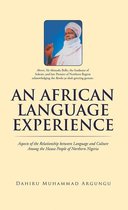Examine the representation of the relationship between language and power inSouth African Literature Ebook Tooltip Ebooks kunnen worden gelezen op uw computer en op daarvoor geschikte e-readers.
Afbeeldingen
Artikel vergelijken
Auteur:
Evelyn Naudorf
- Engels
- E-book
- 9783638191159
- 27 mei 2003
- 15 pagina's
- Adobe ePub
Samenvatting
'The choice of language and the use to which language is put is central to a people's
definition of themselves in relation to their natural and social environment, indeed in
relation to the entire universe.'1
This quote by the Kenyan writer Ngugi expresses the exceedingly important relationship
between language and the individual in general. This relationship is gaining even more
importance for a continent such as Africa, in which large parts of the native population were
oppressed by European colonial powers for centuries. One important instrument of oppression
was definitely language and the feeling of European superiority resulting out of cultural
traditions, such as literature. In South Africa, where two major colonial powers were fighting
for supremacy and many different native ethnic groups were combined in one state, the
question of language would almost naturally provoke conflicts and crisis. In this essay, I
should like to have a closer look at this delicate relationship between language and power in
South African literature with the example of a Black and a White African writer, Sol T.
Plaatje and Nadine Gordimer. In his historical overview, Leonard Thompson already describes the South Africa of the 18th
century as a 'linguistic Babel'2. Afrikaans, a simplified form of Dutch and at first only used in
oral communication, would gradually develop into the lingua franca of South Africa. Today,
its greatest competitor among European languages is English and both languages, together
with nine African languages, belong to the eleven official languages of the postapartheid
South African State. The right of every South African to use the language of his or her choice
is now embedded in the constitution. However, the situation of having eleven official
languages is truly unique world-wide. One of the most pressing question is whether there is a
necessity to agree on a single language as the official one, with the other ten languages
receiving an equally high status, in order to support the current process of nation-building? If
so, should it be English, Afrikaans or one of the African languages? [...]
1 Ngugi wa Thiong'o. Decolonising the Mind, page 4
definition of themselves in relation to their natural and social environment, indeed in
relation to the entire universe.'1
This quote by the Kenyan writer Ngugi expresses the exceedingly important relationship
between language and the individual in general. This relationship is gaining even more
importance for a continent such as Africa, in which large parts of the native population were
oppressed by European colonial powers for centuries. One important instrument of oppression
was definitely language and the feeling of European superiority resulting out of cultural
traditions, such as literature. In South Africa, where two major colonial powers were fighting
for supremacy and many different native ethnic groups were combined in one state, the
question of language would almost naturally provoke conflicts and crisis. In this essay, I
should like to have a closer look at this delicate relationship between language and power in
South African literature with the example of a Black and a White African writer, Sol T.
Plaatje and Nadine Gordimer. In his historical overview, Leonard Thompson already describes the South Africa of the 18th
century as a 'linguistic Babel'2. Afrikaans, a simplified form of Dutch and at first only used in
oral communication, would gradually develop into the lingua franca of South Africa. Today,
its greatest competitor among European languages is English and both languages, together
with nine African languages, belong to the eleven official languages of the postapartheid
South African State. The right of every South African to use the language of his or her choice
is now embedded in the constitution. However, the situation of having eleven official
languages is truly unique world-wide. One of the most pressing question is whether there is a
necessity to agree on a single language as the official one, with the other ten languages
receiving an equally high status, in order to support the current process of nation-building? If
so, should it be English, Afrikaans or one of the African languages? [...]
1 Ngugi wa Thiong'o. Decolonising the Mind, page 4
Productspecificaties
Wij vonden geen specificaties voor jouw zoekopdracht '{SEARCH}'.
Inhoud
- Taal
- en
- Bindwijze
- E-book
- Oorspronkelijke releasedatum
- 27 mei 2003
- Aantal pagina's
- 15
- Ebook Formaat
- Adobe ePub
- Illustraties
- Nee
Betrokkenen
- Hoofdauteur
- Evelyn Naudorf
- Hoofduitgeverij
- Grin Publishing
Lees mogelijkheden
- Lees dit ebook op
- Android (smartphone en tablet) | Kobo e-reader | Desktop (Mac en Windows) | iOS (smartphone en tablet) | Windows (smartphone en tablet)
Overige kenmerken
- Editie
- 1
- Extra groot lettertype
- Nee
- Studieboek
- Nee
EAN
- EAN
- 9783638191159
Je vindt dit artikel in
Kies gewenste uitvoering
Bindwijze
: E-book
Prijsinformatie en bestellen
De prijs van dit product is 12 euro en 99 cent.
Direct beschikbaar
Verkoop door bol
- E-book is direct beschikbaar na aankoop
- E-books lezen is voordelig
- Dag en nacht klantenservice
- Veilig betalen
Houd er rekening mee dat je downloadartikelen niet kunt annuleren of retourneren. Bij nog niet verschenen producten kun je tot de verschijningsdatum annuleren.
Zie ook de retourvoorwaarden
Rapporteer dit artikel
Je wilt melding doen van illegale inhoud over dit artikel:
- Ik wil melding doen als klant
- Ik wil melding doen als autoriteit of trusted flagger
- Ik wil melding doen als partner
- Ik wil melding doen als merkhouder
Geen klant, autoriteit, trusted flagger, merkhouder of partner? Gebruik dan onderstaande link om melding te doen.








